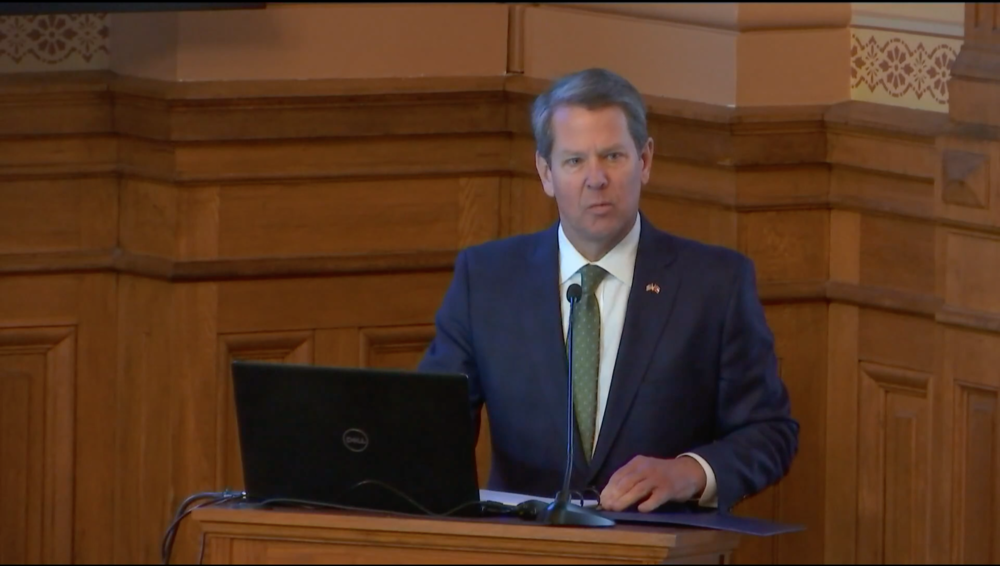Section Branding
Header Content
Kemp Says 2020 Budget Proposal Includes ‘Common-Sense’ Savings
Primary Content
Gov. Brian Kemp told lawmakers Tuesday his $28.1 billion budget includes millions in savings that don’t require drastic cuts to services Georgians need while some agency heads said slashing spending would not be easy.
Speaking to the joint House and Senate Appropriations committees, the Republican talked about his spending plan and the listed several examples of streamlining operations.
“Last summer I met with the leaders of our state agencies, and I challenged them to identify opportunities to streamline operations, eliminate duplicate programs and leverage technology to serve our state citizens better,” he said. “The budget before you shows that reducing costs doesn't require drastic cuts to other agency activities.”
The Department of Community Supervision wants to save money by moving to a virtual office, the Department of Corrections plans to overhaul its timekeeping system and several other agencies are combining similarly-focused programs. He also pointed to an additional $2,000 base pay raise for public school teachers, fulfilling a campaign promise to boost pay by $5,000.
“I'm proud of the common-sense savings included in this budget,” Kemp said. “I believe that we've shown taxpayers that we're good stewards of their hard earned money, and with this blueprint, we will continue to build a state that Georgians will be proud to call home.”
Jeffrey Dorfman, the state’s fiscal economist, walked lawmakers through the international and national economic landscape before drilling down on Georgia’s numbers.
He said that Georgia’s economy will likely continue to grow over the next year, but slower than before, which means less new revenue than anticipated. Additionally, a tax cut passed a few years ago lowered the amount of revenue the state expects to receive by about $500 million.
Dorfman said that when it comes to compromising on budget priorities, it was important to understand the math behind decisions.
“There are parts of our budget that either everybody agrees are priorities and need to grow faster than revenue or that are essentially on autopilot like Medicaid and are growing faster than revenue and there's not much we can do about it,” he said. “In order to have the budget match revenue growth, if some things grow faster than the average other things need to grow slower or be cut. That's just how math works.”
When asked about legislation that could further cut Georgia’s top income tax rate, Dorfman said that the governor’s budget proposal did not include the tax cut in calculations and that he didn’t feel lowering taxes further would do more to attract businesses.
“I don't believe the way you get companies to move to Georgia is by lowering the income tax rate,” Dorfman said. “The reality is that once we add our federal and state income tax rates together, a quarter percent one way or the other on the state income tax rate just doesn't move the bar.”
One solution that could help close the revenue gap is a bill passed by the legislature that would see the state collect sales taxes from many online services known as “marketplace facilitators.”
Estimates show Georgia could collect at least $150 million a year under the measure.
While some agency heads that spoke on Tuesday rattled off savings and more efficient measures taken after the governor called for budget reductions last fall, some leaders said the changes would negatively impact their operations.
“Over the next 18 months, there will be fewer food safety inspections, there'll be fewer animal industry inspections, the span between fuel pump and scale inspections will grow and the growing demand for meat inspection will have to be shifted to our federal partners,” Agriculture Commissioner Gary Black said. “I thank you for listening to this uncomfortable information.”
His department would cut dozens of vacant positions, some of close to 1,000 vacancies across state agencies that would be eliminated under budget proposals.
Secretary of State Brad Raffensperger walked through the various divisions, noting that the corporations division is self-funding and the cost of maintaining Georgia’s old decommissioned touchscreen voting machines due to a court order was costing more than $360,000 a month.
Commissioner of Labor Mark Butler pointed to the state’s record-low unemployment rate as a boon – and a burden – to the state’s economy as companies can’t find workers to fill jobs.
“To give an example back in November, we showed a job growth of roughly about 70,000 jobs and we only added just a little over 10,000 new workers to our workforce,” he said. “That over the long haul is not sustainable. We need that number to be much, much higher.”
Butler said he’d like to see more workforce development to help move people into higher-skill jobs and open up more entry-level positions.


